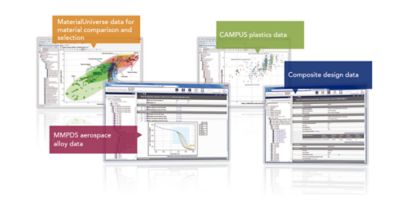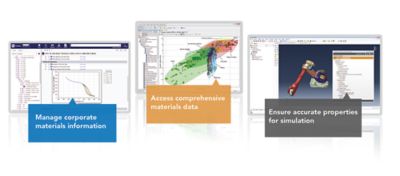-
United States -
United Kingdom -
India -
France -
Deutschland -
Italia -
日本 -
대한민국 -
中国 -
台灣
-
Ansys si impegna a fare in modo che gli studenti di oggi abbiano successo, fornendogli il software gratuito di simulazione ingegneristica.
-
Ansys si impegna a fare in modo che gli studenti di oggi abbiano successo, fornendogli il software gratuito di simulazione ingegneristica.
-
Ansys si impegna a fare in modo che gli studenti di oggi abbiano successo, fornendogli il software gratuito di simulazione ingegneristica.
-
Contattaci -
Opportunità di lavoro -
Studenti e Accademici -
Per Stati Uniti e Canada
+1 844.462.6797
ANSYS BLOG
February 19, 2019
Ansys’ Acquisition of Granta Design Will Advance Material Property Intelligence and Develop Simulation Technology
One of the biggest challenges design engineers face is locating accurate, traceable and manageable material property data. Once engineers have an accurate library of actionable in-house and verified reference data, the challenge becomes selecting the right material for the job.
Finding accurate, detailed and manageable material properties data is a challenge for many engineers.
In the past, Ansys left the responsibility of finding accurate material properties data, and material selection, to the simulation engineer. However, with the acquisition of Granta Design (Granta), Ansys users can have access to tools that are dedicated to materials data management and selection.
“Granta develops and markets software for engineering material intelligence and information management. Its solutions enable customers to control, analyze and apply critical materials data in the engineering process, including tools to support materials selection and substitution decisions,” says Caroline Brown, senior marketing and communications manager at the recently acquired Granta Design.
Granta’s Technology Will Help Ansys Users Manage and Select Materials
Granta software offerings fall under three pillars: managing, selecting and teaching material property data. Supporting this technology is a rich materials library compiled by Granta and its partners.
The materials information management (MIM) tool is GRANTA MI. The tool helps companies capture all of their proprietary materials data in a single system. The companies then make this verified data available to engineers and designers. GRANTA MI guarantees accuracy, consistency and traceability. It also includes a comprehensive library of materials data to complement in-house knowledge.
GRANTA MI also integrates with simulation, computer-aided design (CAD) and product lifecycle management (PLM) software.
For an overview of GRANTA MI, watch this video:
How GRANTA MI works.
Next, there is CES Selector. This tool helps engineers select, compare and replace materials. In essence, CES Selector guides the engineer through a structured material selection process. The tool applies graphical analysis techniques to identify the best material options from its extensive libraries.
For an overview of CES Selector, watch this video:
How CES Selector works.
Finally, Granta offers CES EduPack, a materials science education resource. This set of teaching resources helps educators and university professors develop curricula that are current and engaging to students.
How Granta’s Technology Will Expand the Ansys Experience
Ensuring accurate and appropriate materials data is an important step of every mechanical, fluid, electrical and additive manufacturing simulation. In fact, it’s hard to think of a simulation type that wouldn’t benefit from material intelligence tools.
Granta will bring materials information, selection and intelligence tools to the ANSYS’ portfolio.
As a result, engineers and designers need to better understand how materials selection will affect their product development. By integrating Granta’s technology into Ansys solutions, engineers will have access to high-quality materials information, selection and intelligence tools.
This acquisition will also give Granta users an introduction to Ansys’ multiphysics capabilities. This will help Granta users improve their workflows with simulation.
Finally, users of both Ansys and Granta will enjoy an even tighter integration of their solutions.
As for users of third-party simulation, CAD and PLM software, they will continue to benefit from Granta’s technology and commitment to an open eco-system.
How else will this acquisition affect Ansys? For one, material information technology opens a brand-new dimension in Ansys’ portfolio — one that is tightly coupled with simulation.
Granta is also a spin-off of, and maintains close ties to, the University of Cambridge. So, the acquisition will certainly add to Ansys’ vast pool of intellectual talent, allowing for the development of new materials and simulation technologies and applications.
To learn how Granta’s technology helps Ansys users simulate additive manufacturing, read: Ansys and Granta Design Collaborate To Empower Additive Manufacturing.












